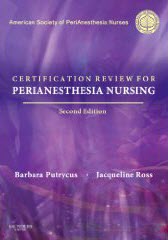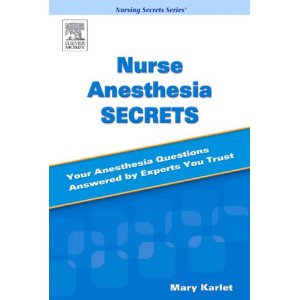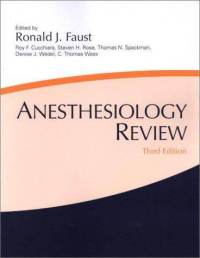Exam Review PACU Certification
August 8, 2011 by Rn2b
Filed under Certified Registered Nurse Anesthetist (CRNA), Nursing Books, Testing and Exam Help
 Certification Review for PeriAnesthesia Nursing
Certification Review for PeriAnesthesia Nursing
Site Price: $42.44
![]()
PACU (post-anesthesia care unit) is the certification needed by the American Society of PeriAnesthsia Nurses (ASPAN) which grants a CRNA right to aid during anesthesia and helping patients recover.
This book, Certification Review for PeriAnesthesia Nursing, is written by ASPAN, and is a question-based CAPA and CPAN exam review. There are 700 questions, explaining rationales and references. It tests your core knowledge, skills, and principles that are necessary in the field.
Become an integral part of hospitals and other medical facilities with your certification.
CRNA Certification Exam Review
June 6, 2011 by Rn2b
Filed under Certified Registered Nurse Anesthetist (CRNA), Nursing Books, Testing and Exam Help
In the surgical field, a Certified Registered Nurse Anesthetist (CRNA) is vital to a successful surgery. A CRNA is an Advanced Practice Registered Nurse (APRN) with a graduate-level education and certified by the American Association of Nurse Anesthetists (AANA). They usually have practiced critical care for one year prior.
Since a CRNA is so educated in the field, when they have a position, it is unlikely they will be replaced by anesthesiologists. Every two years, a CRNA must become recertified, and they require continual education credits depending on the state.
 Many nurses that have CRNA certification used the book Anesthesia Secrets by Duke. It provides straight forward Q&A formatting with reviews of a lot of topics. It covers equipment, daily essential information, pharmacology, disorders, and more.
Many nurses that have CRNA certification used the book Anesthesia Secrets by Duke. It provides straight forward Q&A formatting with reviews of a lot of topics. It covers equipment, daily essential information, pharmacology, disorders, and more.
Another book recommended by CRNAs is Anesthesiology Review by Faust. It has a comprehensive coverage of all the necessary topics, and has an easy to use format. It is in-depth in areas required, and is great for a CRNA foundation and review.
Be a CRNA and Earn Over $100,000
November 30, 2008 by Rn2b
Filed under Certified Registered Nurse Anesthetist (CRNA), Types of Nurses
Nurse anesthetists bear astonishing lines of work. They do work side-by-side with surgeons, dental practitioners, chiropodists, and anesthesiologists day-after-day. IF you want to be a nurse anesthetist, you must be registered as a nurse that has acquired additional education citations and experience to be eligible to administer anesthesia. In a number of the hospitals, the nurse anesthetists are the only personnel that are able administer anesthesia. 3 years ago, the typical yearly earnings for a CRNA was approximately a little over $150,000. It brings a minimum of 7 years of instruction and training for a nurse to acquire the CRNA. When the distinctive candidate plans to this exam, they must have at the minimum of 1,694 hours in the clinical area.
Annually around 1,300 to 1,700 aspiring student nurse anesthesiologists accomplish the tenacious road to be a RN Anesthetist. They commenced this voyage by completing senior high. Then they entered in an undergrad program. To be a nurse anesthesiologist, you must acquire a Bachelor’s degree in Nursing. Once you have your Nursing degree, one will require career experience. You will need at least one year of acute care nursing practice for you to enter a master’s course program.
A good deal of masters programs are available for you to enroll in after you have your career experience. This year alone there are over 100 nurse anesthetist curricula. These programs extend for 2 to 3 years. One will be taking a grad program that will be teaching higher teaching in pharmacology, physiology, anatomy, and etc. You will also learn numerous anesthesia styles and variety operations for surgical and obstetric procedures. You will achieve this knowledge by training in classroom-based or in advanced community hospitals.
When you successfully finish the anesthetist course, you will be entitled to undergo the exam for CRNA. Upon passing the CRNA make it a point to register in the area or the state you reside in. Majority of the states in America also have an organization for anesthetists nurse.

